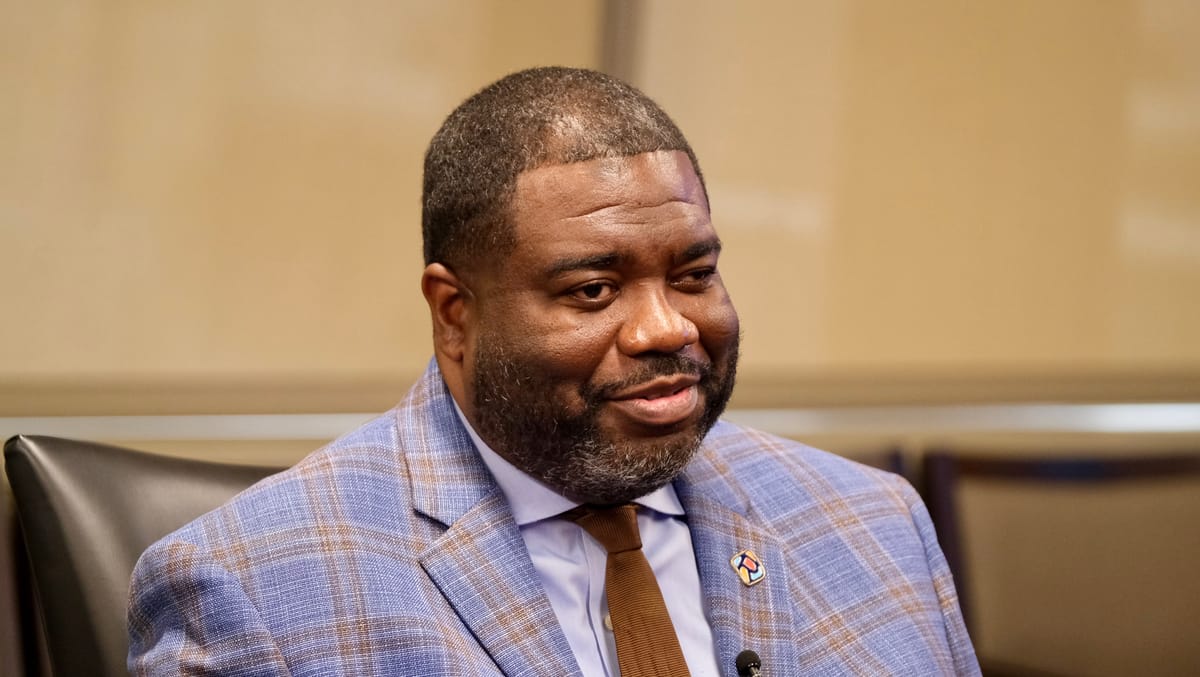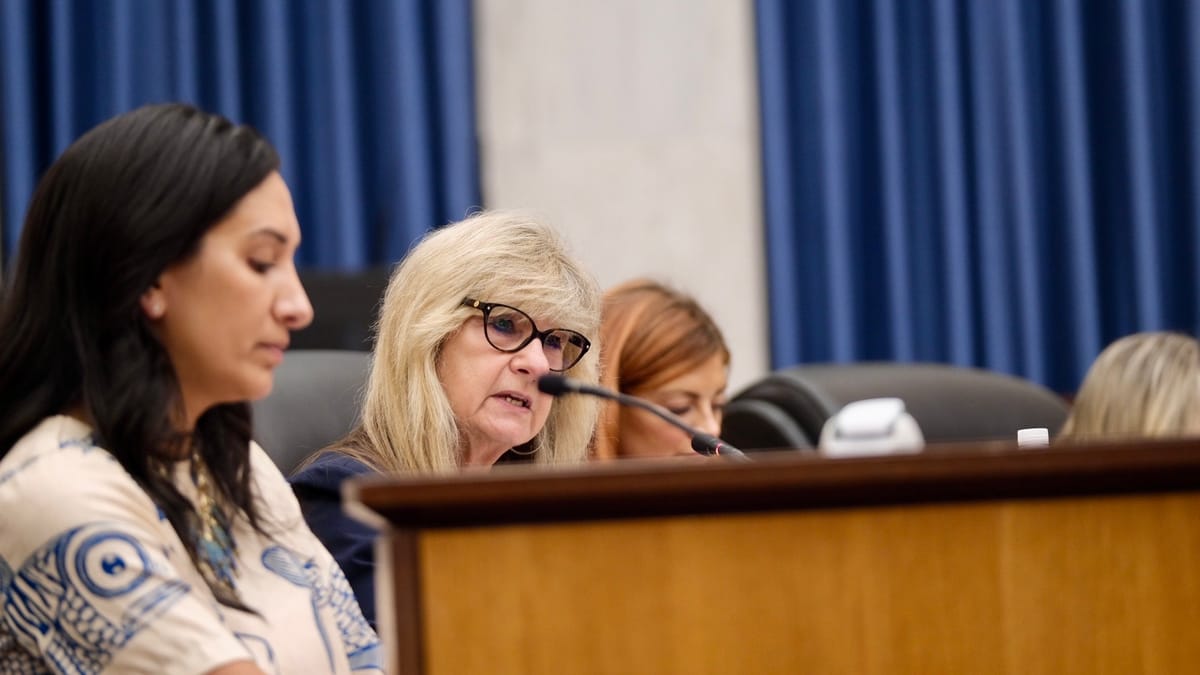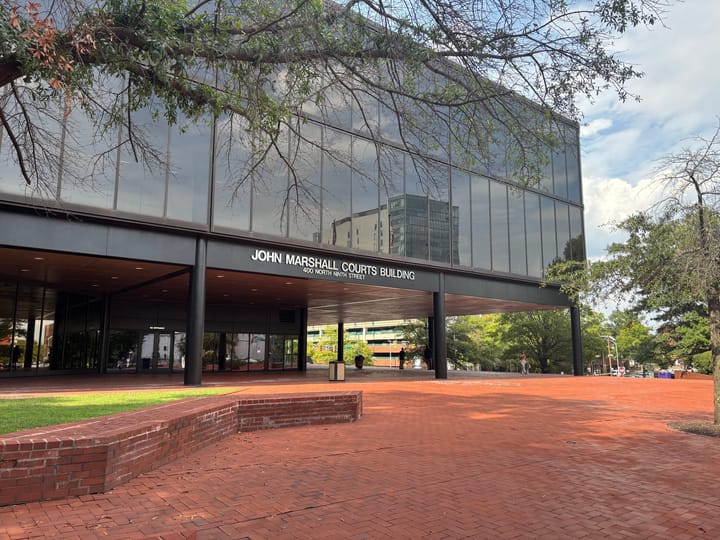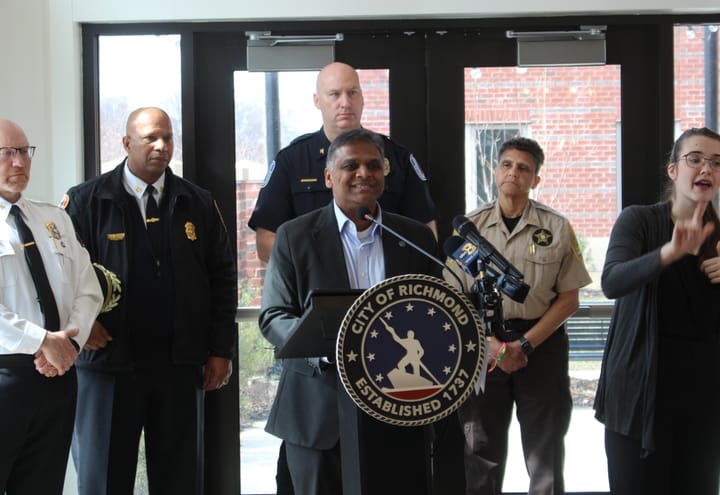Would Avula admin budget for lower taxes if Council asked? ‘No ma’am,’ says CAO

At a recent Richmond City Council committee meeting, Councilor Ellen Robertson (6th District) asked a particularly direct question.
If the Council voted to ask Mayor Danny Avula to build a budget based on a lower property tax rate, she inquired, would the administration do it?
“No ma’am,” said Chief Administrative Officer Odie Donald II, an Avula appointee who arrived in Richmond from Atlanta over the summer.
The blunt answer from City Hall’s top administrator highlighted the limits of the Council’s power to influence the city’s budget and tax policies without the blessing of the executive branch.
In the tax rate discussion, local policymakers are torn between two competing priorities.
Officials say the city needs more money to continue improving government services, investing in Richmond Public Schools and raising pay for public employees to meet collective bargaining obligations.
But as the city wrestles with higher costs of living, several Council members believe local tax policies are one of many factors making Richmond increasingly unaffordable for people with modest incomes and pricing some longtime residents out of fast-changing neighborhoods.
A resolution pending before the Council would formally request that the Avula administration give Council the option of adopting a lower tax rate next year, without committing to doing it. Donald’s remark indicates the administration won’t go along with that intermediate step and would refuse to show the Council what a lower-tax budget might look like.
The Council has not taken a final vote on the matter. Because of the Avula administration's stance, it’s not clear the upcoming vote at a Dec. 8 Council meeting will make a difference even if it passes.
The CAO’s answer didn’t sit well with some Council members.
“We’ve got people who are in unelected office publicly stating they are going to defy the will of a body that was elected by the people of the city of Richmond,” Councilor Sarah Abubaker (4th District), who supports a lower tax rate, said in an interview. “And that to me is the most problematic of it all.”
In a sternly worded memo to Donald about his comment, Abubaker said the Council is asking for more insight into multiple budget scenarios.
“To shut down that request outright, rather than engage in a transparent discussion, sends the wrong signal about the administration’s commitment to the collaborative, open budgeting process that Richmonders were told to expect with this new administration,” Abubaker wrote.
At the committee meeting, Donald said he believes it’s “within the Council members’ purview” to make the request. But preparing “dual budgets,” he said, would be a challenge.
“We have a hard enough time making these deadlines as it is,” Donald said.
Under Richmond’s strong mayor government, Avula prepares a budget proposal for the Council’s review each spring, but the work of preparing that budget begins months earlier. As the legislative body, the Council has final approval over the budget and city tax rates.
The Avula administration has told the Council it shouldn’t adjust the tax rate in the middle of the budget cycle in response to rising property assessments that cause tax increases. The administration’s latest stance shows it also feels the Council shouldn’t be giving the mayor instructions on the tax rate at the very beginning of a new budget cycle.
That leaves only the official budget approval process in the spring, but the Council’s power is limited then too. This year, city administrators strongly resisted Council efforts to make even minor spending adjustments impacting just a few million dollars in a billion-dollar operating budget. That dynamic has fueled complaints from Council members who feel they’re left powerless to change much of anything after the budget has been written and balanced by the mayor’s team.
Councilor Stephanie Lynch (5th District) was trying to get around those roadblocks by putting forward a resolution asking Avula to prepare a lower-tax version of the budget for the Council’s consideration next year. She’s requesting a budget plan with a property tax rate of $1.16 per $100 of assessed value, four cents lower than the city’s longstanding $1.20 rate.
It was that proposal Robertson asked Donald about at last week’s meeting of the Council’s Finance and Economic Development Committee.
At the committee hearing, Lynch said her proposal wasn’t meant to be “controversial or shell-shocking” but was “simply meant to start a conversation.”
With many residents feeling “overburdened” by steadily rising tax bills, Lynch said, her proposal would give the Council the option of passing a budget next year that lightens that burden.
“This allows us to have a dialogue from the onset,” said Lynch, adding that she believes the city could lower the rate without cutting the budget.
Abubaker said she too sees the resolution as a way for the Council to make more informed budget choices without committing to either option.
“We’re not even saying we want to lower taxes,” Abubaker said. “We’re saying we want to see a budget with options for $1.20 and $1.16.”
Richmond’s neighboring counties have lower tax rates. Chesterfield County’s current real estate tax rate is $0.89 per $100 of value. Henrico County’s is $0.83.
Dropping Richmond’s rate to $1.16 would likely reduce city revenues by about $17.2 million, while saving a typical Richmond homeowner a little more than $150 on their yearly tax bill for a home valued at $400,000.
Under a state law that prevents localities from collecting tax windfalls from spiking property values without disclosing what’s happening to the public, even the $1.16 rate had to be advertised as a tax increase. That’s because Richmond property assessments are rising fast enough that both tax bills and the city budget would still grow even under a reduced rate.
Under the logic of the state law, city policymakers aren’t choosing between a tax cut and the status quo. They’re choosing between a smaller tax increase or a larger one.
The Avula administration uses different language to frame the tax rate debate, arguing a lower rate would cut the budget and put the city in a “deficit” status.
Donald said the city is facing too many financial needs and too many economic unknowns to afford to reduce its revenue in a way that could impact services and personnel.
“To go to $1.16 you are then essentially cutting something that is in place today,” Donald said. “That’s the simplest way that I can explain it.”

Differing views on the budget surplus
The CAO downplayed the significance of the estimated $22 million surplus the city is reporting for its last full budget year that ended June 30. That’s an unaudited number that could still change as the city solidifies its year-end numbers, he said, and it shouldn’t be tied into the tax rate discussion.
“Producing these premature estimates, it kind of gives a risk of some unstable and inaccurate figures that can be misused, unintentionally, in some of the policy debates,” Donald said.
Some Council members see the double-digit surplus as another sign that the city’s budget is healthy enough that some amount of tax relief should be doable.
Most of that estimated surplus will go into the city’s reserve funds. After Donald stressed the importance of building up the city’s so-called rainy day fund, Councilor Reva Trammell (8th District) said in an interview: “What the hell is it doing now?”
After trying for years to have the tax rate lowered based on what she says she hears from residents in her Southside district, Trammell is co-sponsoring Lynch’s proposal.
“My people have their own voice. And I know what they say,” said Trammell, who called Donald a “CAO who just got here.”
In a statement, Councilor Kenya Gibson (3rd District) said having the surplus number is “both relevant and critical to having an informed discussion about the property tax rate.”
“My office is working on revisions to ensure we receive this information sooner,” Gibson said.
Gibson had asked for an estimate of the surplus before the Council voted to keep the tax rate unchanged last month. The administration did not provide the number until Nov. 15, the deadline set in the city code.

Council proposal points to 46% growth in city spending since FY20
Lynch’s resolution — billed as an “affirmation of the city’s commitment to live within its fiscal means” — cites several budgetary trends to make the case that city revenues would still grow even if the growth in residents’ tax bills is slowed down.
Total residential property values in Richmond have grown from $12.6 billion in tax year 2018 to $23.5 billion in tax year 2025, the resolution says, an increase of 86.5%.
Since fiscal year 2020, the city’s real estate tax revenue has grown 47%, and the city’s general fund spending has grown 46%.
That spending growth has occurred at a time of high inflation, when many goods and services the city purchases became significantly more expensive.
Some Council members on the finance committee appeared hesitant about Lynch’s proposal.
Robertson, who chairs the committee, said that if it passed it would be "interesting to see what we get” back from the administration. But she questioned whether it was a good move for the Council to pass something without knowing what it could mean.
“I’m really not feeling comfortable about this because I’m not sure if I’m considering the liability that we potentially could be asking for and just not knowing,” Robertson said.
Councilor Nicole Jones (9th District), said she wants the city to be clearer with residents about what its financial goals are.
“We cannot continue to politicize the money issue,” Jones said.
Contact Reporter Graham Moomaw at gmoomaw@richmonder.org








